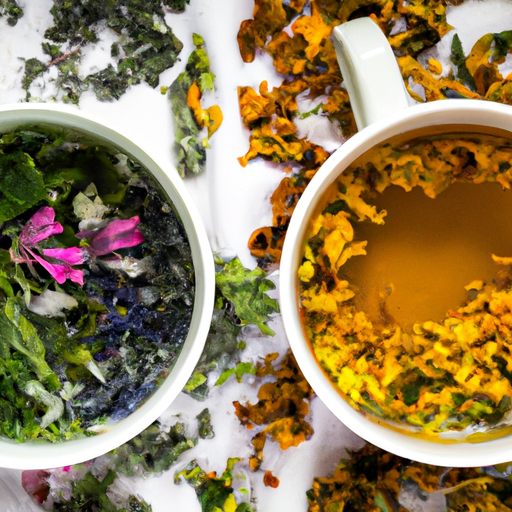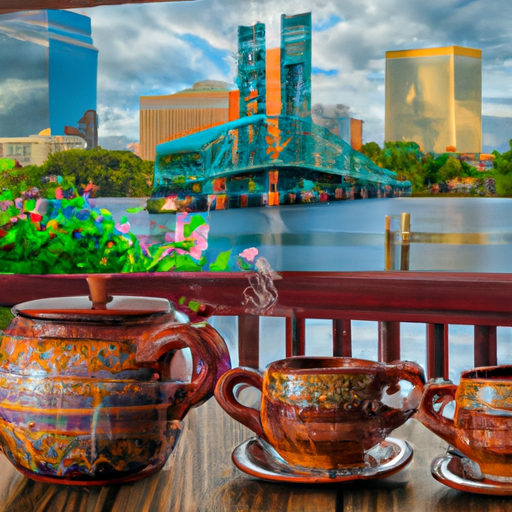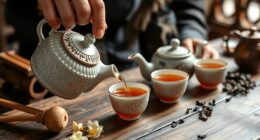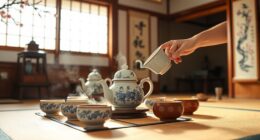When it comes to tea, there is a vast array of options to choose from. From traditional varieties to fruity infusions, the choices seem endless.
However, not all beverages labeled as ‘tea’ fall into the category of herbal tea. In fact, there are certain criteria that must be met for a beverage to be considered herbal tea.
In this article, I will explore what herbal tea is not. By delving into the world of traditional tea varieties, fruit infusions, rooibos, yerba mate, flower infusions, and herbal tisanes, we will uncover the true essence of herbal tea.
So, if you’ve ever wondered what sets herbal tea apart from the rest, join me on this journey of discovery. Together, we will unravel the mysteries of what is not considered herbal tea and gain a deeper understanding of this beloved beverage.
Key Takeaways
- Not all beverages labeled as ‘tea’ are herbal tea.
- Traditional tea varieties like black, green, oolong, and white tea are not herbal tea.
- Herbal tea is made from herbs, flowers, or other plant materials.
- Herbal tisanes are not derived from the Camellia sinensis plant.
Traditional Tea Varieties
Traditional tea varieties, such as black, green, oolong, and white tea, are not typically categorized as herbal tea because they come from the Camellia sinensis plant, unlike herbal tea which is made from herbs, flowers, or other plant materials.
These teas have been consumed for centuries and are known for their health benefits. For example, black tea is rich in antioxidants that can help reduce the risk of heart disease and improve gut health. Green tea contains polyphenols that have been shown to boost metabolism and aid in weight loss. Oolong tea has been associated with reducing the risk of chronic diseases like heart disease and diabetes. White tea is known for its high levels of antioxidants that can help protect the body against free radicals.
Brewing techniques for traditional tea varieties vary depending on the type of tea and personal preference. Generally, the leaves are steeped in hot water for a specific amount of time to extract their flavors and aromas. Black tea is typically steeped for 3-5 minutes, while green tea is steeped for 1-3 minutes at a lower temperature to preserve its delicate flavors. Oolong tea is often steeped for 3-7 minutes, and white tea is brewed for 2-3 minutes.
Moving on to fruit infusions, these are a popular alternative to traditional tea varieties.
Fruit Infusions
Modern fruit infusions, like a refreshing blend of berries and citrus, offer a delightful alternative to conventional tea options. These fruit teas aren’t just delicious but also packed with numerous health benefits. Here are four reasons why fruit infusions should be part of your daily routine:
-
Antioxidant Powerhouse: Fruit teas are rich in antioxidants, which help fight off harmful free radicals in the body. The combination of fruits like berries and citrus provides a potent dose of these beneficial compounds.
-
Immune System Boost: Many fruits used in infusions, such as oranges and lemons, are high in vitamin C. This essential nutrient strengthens the immune system and helps protect against common illnesses.
-
Hydration Support: Fruit infusions can contribute to your daily fluid intake, promoting hydration. Staying properly hydrated is essential for overall well-being and can help with digestion, skin health, and energy levels.
-
Natural Sweetness: Fruit teas often have a naturally sweet taste, making them a great option for those trying to cut back on added sugars. Enjoying a cup of fruit infusion can satisfy your sweet tooth without the guilt.
Transitioning into the next section about ‘rooibos,’ it’s important to explore the unique qualities of this South African herbal tea.
Rooibos
Indulge in the rich and earthy flavors of rooibos tea, a South African delight that will leave you craving more. Rooibos, also known as red bush tea, is not technically a tea as it does not come from the Camellia sinensis plant. Instead, it is an herbal infusion made from the leaves of the Aspalathus linearis plant.
Rooibos tea is renowned for its numerous health benefits. It is packed with antioxidants, such as aspalathin and nothofagin, which help to fight inflammation and protect against oxidative stress. These antioxidants have been linked to a reduced risk of chronic diseases, including heart disease and certain types of cancer. Additionally, rooibos tea is naturally caffeine-free, making it a great choice for those looking to reduce their caffeine intake.
Let’s take a closer look at the health benefits of rooibos tea:
| Health Benefits | Description |
|---|---|
| Antioxidant-rich | Rooibos tea contains high levels of antioxidants, which help protect cells from damage caused by free radicals. |
| Anti-inflammatory | The anti-inflammatory properties of rooibos tea can help reduce inflammation in the body, potentially benefiting those with inflammatory conditions such as arthritis. |
| Heart Health | Studies have shown that rooibos tea may help lower blood pressure and cholesterol levels, reducing the risk of heart disease. |
| Digestive Health | Rooibos tea has been found to have soothing effects on the digestive system, relieving symptoms such as indigestion and stomach cramps. |
With its impressive health benefits and caffeine-free nature, rooibos tea is a wonderful addition to any tea lover’s collection. Now, let’s explore the next herbal infusion on our list: yerba mate.
Yerba Mate
Get ready to experience the invigorating and energizing flavors of yerba mate, a South American delight that’ll leave you feeling refreshed and revitalized.
Yerba mate is not only a delicious beverage, but it also offers numerous health benefits. It’s rich in antioxidants, vitamins, and minerals, making it a great choice for those looking to boost their immune system and improve their overall well-being. Yerba mate has been found to aid in digestion, promote mental focus, and even enhance weight loss.
One of the most popular ways to enjoy yerba mate is by brewing it as a traditional tea. Simply steep the leaves in hot water for a few minutes and enjoy the earthy, slightly bitter taste. However, there are many other creative ways to incorporate yerba mate into your daily routine. You can try adding it to smoothies for an extra energy boost or even use it as a base for homemade ice cream or sorbet.
In the next section, we’ll explore the world of flower infusions and discover the delightful flavors and aromas they bring to our teas.
Flower Infusions
When it comes to flower infusions, chamomile, hibiscus, lavender, and other flower-based infusions are some of the most popular choices. These flowers not only provide a delicate and floral flavor to the infusion, but they also have relaxation properties that can help to calm the mind and promote a sense of well-being.
Chamomile, in particular, is well-known for its soothing effects and is often used as a natural remedy for sleep disorders and anxiety.
Chamomile, hibiscus, lavender, and other flower-based infusions
Chamomile, hibiscus, lavender, and other flower-based infusions are like a soothing bouquet in a cup. These herbal teas offer a delightful alternative to chamomile, with their unique flavors and health benefits.
-
Chamomile alternatives: While chamomile is widely known for its calming properties, other flower-based infusions can provide similar effects. Lavender, for example, has been used for centuries to promote relaxation and reduce anxiety. Its aromatic scent and soothing taste make it a perfect choice for unwinding after a long day.
-
Health benefits of lavender: Apart from its calming effects, lavender also offers various health benefits. It’s known to have anti-inflammatory properties, help with digestive issues, and even aid in sleep disorders. Adding lavender to your herbal tea rotation can provide not only a pleasant flavor but also potential therapeutic benefits.
-
Floral flavors and relaxation properties: Flower-based infusions not only offer a range of floral flavors but also possess relaxation properties that can help alleviate stress and promote a sense of calm. Exploring different flower-based herbal teas can provide a diverse and soothing experience, perfect for moments of tranquility and rejuvenation.
Moving on to the next section about ‘floral flavors and relaxation properties,’ we delve deeper into the world of flower-infused teas.
Floral flavors and relaxation properties
Indulge in the soothing embrace of floral flavors and experience the relaxation properties of flower-infused infusions. Floral teas not only offer a delightful taste but also provide numerous health benefits. These teas are often made by infusing various flowers such as chamomile, hibiscus, and lavender into hot water. The result is a fragrant beverage that can help calm the mind and promote a sense of tranquility.
Floral teas are known for their ability to aid in relaxation and stress relief. Chamomile, for example, has been used for centuries as a natural remedy for anxiety and insomnia. Its gentle, floral aroma can help soothe the senses and promote a restful sleep. Hibiscus, on the other hand, is known for its high levels of antioxidants, which can help reduce inflammation and support heart health.
A 2 column and 5 row table in markdown format:
| Flower Tea | Health Benefits |
|---|---|
| Chamomile | Calming, sleep aid |
| Hibiscus | Antioxidant-rich, heart health |
| Lavender | Relaxation, stress relief |
| Rose | Mood booster, digestion support |
| Jasmine | Anxiety relief, immune support |
Floral teas are just one category of herbal tisanes, which are caffeine-free infusions made from various plants and herbs. These tisanes offer a wide range of flavors and health benefits, making them a popular choice for those seeking natural remedies and a moment of relaxation.
Herbal Tisanes
Herbal tisanes are a delightful and caffeine-free option for tea lovers. These unique infusions are made from a variety of dried flowers, leaves, seeds, and roots, offering a wide range of flavors and health benefits. Unlike traditional teas, which aren’t derived from the Camellia sinensis plant, herbal tisanes don’t contain any actual tea leaves.
One of the main advantages of herbal tisanes is their potential health benefits. Many herbs used in these infusions have been used for centuries in traditional medicine for their therapeutic properties. For example, chamomile tisane is known for its calming effects and can aid in relaxation and sleep. Peppermint tisane is often used to soothe digestion issues and relieve headaches. Rooibos tisane, derived from a South African plant, is rich in antioxidants and may help support a healthy immune system.
While herbal tisanes are often referred to as ‘herbal teas,’ it’s important to note that they’re not technically considered teas. Teas are specifically derived from the Camellia sinensis plant, whereas herbal tisanes are made from a variety of other plants. Non-tea infusions, such as fruit infusions and spice blends, offer their own unique flavors and benefits. These infusions provide a refreshing alternative to tea, and they can be enjoyed hot or cold.
Moving on to the next section, let’s explore the world of non-tea infusions and their diverse flavors and properties.
Non-Tea Infusions
Non-tea infusions offer a diverse array of flavors and properties, providing a captivating alternative to traditional teas. These infusions, made from herbs, flowers, fruits, and spices, offer a range of health benefits and culinary uses.
When it comes to health benefits, non-tea infusions can be just as beneficial as herbal teas. For example, chamomile infusion is known for its calming properties, helping to reduce anxiety and promote better sleep. Peppermint infusion is often used to soothe digestive issues and relieve headaches. Hibiscus infusion is rich in antioxidants and can help lower blood pressure. These are just a few examples of the many health benefits that non-tea infusions can provide.
In addition to their health benefits, non-tea infusions are widely used in culinary applications. They can be used to add unique flavors and aromas to both sweet and savory dishes. For instance, lavender infusion can be used to enhance the flavor of baked goods, while ginger infusion adds a spicy kick to stir-fries and marinades. The possibilities are endless when it comes to incorporating non-tea infusions into your cooking.
Overall, non-tea infusions are a wonderful way to explore new flavors and reap the benefits of different herbs and spices. Whether you’re looking for a calming cup before bed or want to add a burst of flavor to your favorite dish, non-tea infusions offer a world of possibilities.
Frequently Asked Questions
Can herbal tea be made from traditional tea varieties like black or green tea?
No, herbal tea cannot be made from traditional tea varieties like black or green tea. Herbal tea is made from the infusion of herbs, spices, or other plant materials, not from the Camellia sinensis plant.
What are the health benefits of fruit infusions and how do they differ from herbal tea?
Fruit infusions offer a range of health benefits. Certain fruits, like berries and citrus, are known for their unique properties, such as antioxidants and vitamin C. Popular recipes include combinations like strawberry-mint or lemon-ginger, maximizing both flavor and health benefits.
Is rooibos considered a type of herbal tea or does it fall under a different category?
Rooibos is a type of herbal tea that falls under a different category known as "red tea." It is not considered a true tea because it does not come from the Camellia sinensis plant.
How does yerba mate compare to herbal tea in terms of taste and benefits?
Yerba mate offers a unique taste and a variety of benefits compared to herbal tea. Its robust flavor is often described as earthy and grassy. In terms of benefits, yerba mate contains more caffeine and antioxidants than most herbal teas. When comparing yerba mate to other traditional tea varieties, it stands out for its distinct flavor profile and energizing properties.
Are flower infusions classified as herbal tea and what are some popular flower options for making tea?
Flower infusions are not classified as herbal tea. While herbal teas are made from herbs and botanicals, flower infusions specifically use flowers. Popular flower options for tea include chamomile, hibiscus, lavender, and rose.
Conclusion
In conclusion, it’s important to differentiate between true herbal teas and other infusions. Traditional tea varieties come from the Camellia sinensis plant. However, fruit infusions, rooibos, yerba mate, flower infusions, and herbal tisanes do not fall into this category. These non-tea infusions may have their own unique flavors and benefits, but they lack the true essence of tea. Just like a ship without a sail, they navigate the vast sea of beverages, but they do not embody the essence of true tea.










